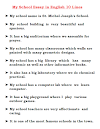Education serves as the foundation for personal growth and societal progress. Beyond the acquisition of knowledge and skills, there is an increasingly vital need for humanity education. This essay explores the imperative of incorporating lessons in empathy, compassion, and social responsibility into our educational systems.
Essay on Need of Humanity in Education System
In today's world, we face a crisis of humanity marked by rising intolerance, divisiveness, and a lack of empathy. News headlines are often filled with stories of conflicts, discrimination, and social injustice. It is evident that mere academic education is insufficient to address these challenges.
Role of Humanity Education
Empathy and Compassion: Humanity education fosters empathy and compassion by teaching students to understand and relate to the experiences and feelings of others. This empathetic perspective helps build stronger, more cohesive communities.
Conflict Resolution: Humanity education equips individuals with conflict resolution skills, emphasizing dialogue, negotiation, and peaceful coexistence. It encourages individuals to find common ground and seek non-violent solutions to disputes.
Global Citizenship: In an interconnected world, humanity education promotes global citizenship, encouraging students to think beyond national borders and act as responsible, compassionate members of the global community.
Social Responsibility: It instills a sense of social responsibility, motivating individuals to actively engage in addressing societal issues, from poverty and inequality to environmental conservation.
Implementing Humanity Education
Incorporate It into Curriculum: Humanity education should be integrated into the curriculum at all levels of education, from elementary to higher education.
Teacher Training: Teachers should receive training in imparting humanity education effectively, emphasizing the importance of leading by example.
Experiential Learning: Practical experiences, such as volunteering and community service, should be part of the education process to reinforce the values of empathy and social responsibility.
Cultivate Critical Thinking: Encourage critical thinking and open dialogue to help students develop their own perspectives on complex social issues.
Conclusion
In a world rife with discord and division, humanity education is not a luxury but a necessity. It equips individuals with the emotional intelligence and moral compass needed to navigate the challenges of the 21st century. By fostering empathy, compassion, and social responsibility, our education systems can nurture a generation of global citizens committed to creating a more just, inclusive, and humane world.
Also Read:























0 Comments